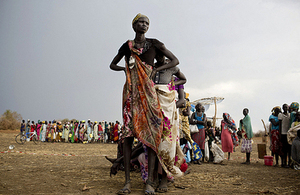UK to provide seeds and fishing kits to avoid starvation in South Sudan
Vital support to help farmers affected by conflict before the rainy season begins.

Women displaced by conflict in South Sudan queue to collect food rations in the town of Mingkaman, March 2014. Picture: UNICEF/Kate Holt
Britain will provide seeds and fishing kits to families in South Sudan to avert a possible hunger crisis, International Development Secretary Justine Greening announced today.
This vital support will reach farmers before the rainy season begins at the end of April, after which they will be unable to sow their crops.
The £8.3 million grant will help 390,000 people feed themselves for 12 months. 40,000 families will be provided with either seeds to grow staple crops, nutrient rich vegetables or hooks and lines to catch fish for themselves and others.
It will also provide vaccinations to keep 80 families’ cattle healthy for a month. Securing the health of livestock in South Sudan is important to improving nutrition, particularly for children and infants who rely on milk as a core part of their diet.
International Development Secretary Justine Greening said:
“Millions of vulnerable people caught up in the conflict in South Sudan are at risk of a secondary hunger crisis. British aid will allow families to grow the crops they need to support themselves over the coming months. By acting now we can help families prepare before the rainy season begins.”
DFID’s support will contribute to an appeal from the Food and Agriculture Organization of the United Nations (FAO) for £47 million to assist around 2.3 million people in urgent need of support.
Sue Lautze, who heads FAO’s team in South Sudan said:
“Some seven million people are facing the risk of hunger, including nearly one million people who have fled their homes as a result of the fighting and the fear it generates. It is not only people who are being displaced. Over ten million head of livestock have been taken away from their usual grazing routes.
“We have an extremely tight window in which to deliver seeds and other vitally-needed inputs to farmers. It is already starting to rain in some areas. Once the rain comes, it is too late to plant and vast areas become inaccessible.”
The conflict which began in Juba on 15 December 2013 displaced many families, prevented farmers from buying seeds and stopped families travelling to market to buy food.
Infographics

Infographic: UK aid - South Sudan humanitairian update 27 March 2014
View infographics on the UK’s response to the crisis in South Sudan on Flickr
Notes to editors:
-
The British government has provided £12.5 million of humanitarian funding since the start of the latest crisis. A breakdown of this assistance is available online: http://www.gov.uk/government/news/britain-to-provide-tents-and-medical-aid-to-south-sudan
-
In 2013, DFID allocated more than £60 million for humanitarian activities in South Sudan.
-
Before the current crisis, South Sudan was already one of the poorest countries in the world with more than half of the 8.3 million population living below the poverty line.
General media queries (24 hours)
Email mediateam@dfid.gov.uk
Telephone 020 7023 0600
If you have an urgent media query, please email the DFID Media Team on mediateam@dfid.gov.uk in the first instance and we will respond as soon as possible.